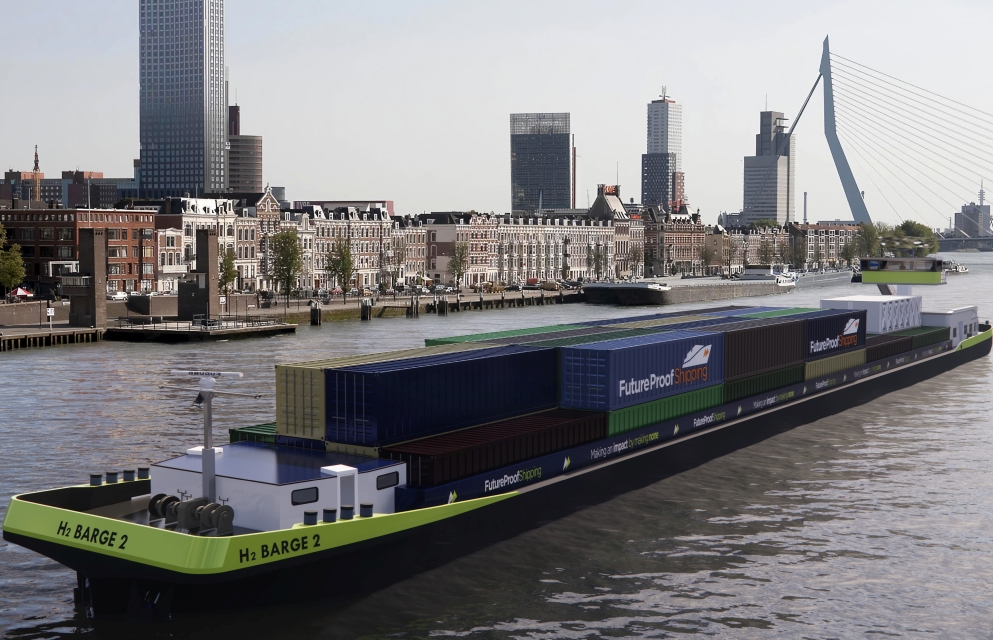Dutch shipowner Future Proof Shipping (FPS), the EU-funded Flagships project, and the Interreg-funded ZEM Ports NS project have launched the groundbreaking H2 Barge 2. The hydrogen-powered vessel will ship goods completely emission-free on the Rhine between Rotterdam, the Netherlands, and Duisburg, Germany.
Future Proof Shipping, the Flagships project, and ZEM Ports NS project gathered key stakeholders to celebrate the successful launch of the H2 Barge 2 at Holland Shipyard Group’s Werkendam facility, just outside Rotterdam.
CEO of Future Proof Shipping, Richard Klatten: ‘This is another proud moment for us, it proves moving cargo with zero emissions and zero impact is not only possible, it’s scalable too. Successfully launching our second hydrogen-powered inland cargo vessel is just as important an achievement as the first, not just for Future Proof Shipping, ZEM Ports NS, and the Flagships project, but for the future of green shipping. This vessel now sets the standard for inland shipping and beyond.’
Also read: Ballard supplies fuel cells for FPS Waal retrofit
Successful retrofit
The H2 Barge 2 is the first of two demonstrators in the EU-funded Flagships project, and the second demonstrator of the ZEM Ports NS project. The vessel, formerly Fenny 1 and FPS Waal, was built as a conventionally powered container ship.
During 2023, H2 Barge 2 was stripped of all combustion engines, reduction gearbox and fossil fuel tanks at Holland Shipyards Group (HSG) in Werkendam. The diesel engine driving the bow thruster and diesel generators was replaced with a new modular propulsion system. This system includes electric motors, hydrogen tanks, a Proton Exchange Membrane (PEM) fuel cell system for converting hydrogen into electric power, and a battery system. Six fuel cells from Ballard Power Systems raise the total power installed to 1.2 MW.
‘Inland waterways are important for freight transport in Europe, we are thrilled to see a high-power container vessel being converted to zero-emission,’ states Mirela Atanasiu, executive director ad interim of Clean Hydrogen Partnership. ‘The H2 Barge 2 will bring knowledge on how to retrofit vessels from diesel combustion to zero-emission alternatives, by using batteries in combination with green hydrogen in a fuel cell. I am proud to see that our funding contributes to the decarbonisation of freight transport in the European Union.’
H2 Barge 2 is expected to reduce 3000 tonnes of CO2 annually when sailing the Rhine. With eighty per cent of all cargo flows on the Rhine sailing between Rotterdam and Duisburg, H2 Barge 2 proves that much of the fleet can be fully zero emission already today.
Also read: FPS joins Flagships project to realise second hydrogen inland container ship
Global importance
Flagships project coordinator and senior scientist at VTT, Jyrki Mikkola: ‘We’ve been working hard for several years to get to this point. Having the first demonstrator on the Rhine is truly a great achievement by Future Proof Shipping and the rest of the partners. The aim of the Flagships project is to take zero-emission waterborne transport to an entirely new level. Now we’re one important step closer to reaching our goal.’
The second demonstrator vessel in the Flagships project, Zulu 06, will be deployed in Paris in 2024.
Also read: Flagships’ hydrogen powered river barge Zulu 06 on its way to France
Interreg funding
This project was made possible with funding support from the Interreg North Sea Region Programme (Zero Emission Ports North Sea – ZEM Ports NS), Flagships H2020 Project (Clean Hydrogen Partnership), and Netherlands Enterprise Agency (RVO).
The pivotal moment of the launch of the F2 Barge 2 is shared by the FPS team, Holland Shipyards Group (HSG), Ballard Power Systems, and partners and supporters at the Port of Rotterdam, Expertise- en InnovatieCentrum Binnenvaart (EICB), Zero Emissions Ship Technology Association (ZESTAs), WaterborneTP, NSHyMap, RH2INE and Maritime CleanTech.
H2 Barge 2
- Formerly known as FPS Waal and Fenny 1 (built 1993)
- Size: 109.8 metres long, 11.4 metres wide
- Retrofit: 2023, Holland Shipyards Group (HSG), Werkendam
- Capacity: 190 TEU
- Route: Rotterdam – Duisburg
- Fuel cells: 6×200 kW (FC Wave from Ballard Power Systems)
Also read: VIDEO: Holland Shipyards’ 3D printed ferry spotted on the water








